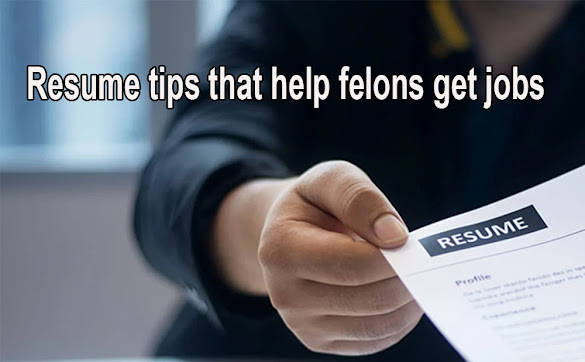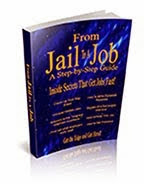Skilled felon is looking for jobs
Where can we turn? He is a hard worker.
Nancy
Hello Nancy,
Your son is ahead of most ex-offenders and felons looking for jobs. Even though things might seem tough, people with criminal record might have to thing outside-the-box when it comes to looking for work. He has skills in electrical work and carpentry. He could start a home handyman business the he can can use to build a good income. If he is willing to put in a little work, he could turn odd jobs into a full time home handyman business. You'd be amazed how many people can't put in a light switch or fix a leaky faucet. You could offer to do small jobs at a fraction of what big time contractors charge while guaranteeing quality work.
 Starting his own business will be a lot of work. He would have to be prepared to work long hours finding customers and promoting his business. The least costly way to start is to print up flyers with tear off tags, and post them on community bulletin boards. Post them in grocery stores, laundry rooms, community recreation centers, bus stops, and churches. Highlight the quality of his service and his dependability. He should always include phone number tear off tags on the flyer, so interested people can just take one phone number.
Starting his own business will be a lot of work. He would have to be prepared to work long hours finding customers and promoting his business. The least costly way to start is to print up flyers with tear off tags, and post them on community bulletin boards. Post them in grocery stores, laundry rooms, community recreation centers, bus stops, and churches. Highlight the quality of his service and his dependability. He should always include phone number tear off tags on the flyer, so interested people can just take one phone number.
Another interesting option is to make a list of local contractors and offer to himself out as a day laborer. There are probably quite a few contractors in your area looking for day laborers as a way to keep their own costs down. He could get a list of contractors that have recently been issued building permits at your local municipal building. This is public record so he should have no trouble getting that information.
Still another option is to find landlord with multiple rental properties. Landlords need dependable people to keep the properties up and do repairs that tenants need done. If he finds one with enough rentals, it could be a full time job that would pay well. One great way to find a long list of property owners is contacting your local office of Housing and Urban Development. HUD pays subsidies to landlords on behalf of tenants. In order to get payments, the properties must meet HUD standards and are inspected frequently.
If his dream is finding regular employment, he shouldn't give up and he could earn a living in the meantime.
I hope this helps.
Skilled felon is looking for jobs
Hello Nancy,
Your son is ahead of most ex-offenders and felons looking for jobs. Even though things might seem tough, people with criminal record might have to thing outside-the-box when it comes to looking for work. He has skills in electrical work and carpentry. He could start a home handyman business the he can can use to build a good income. If he is willing to put in a little work, he could turn odd jobs into a full time home handyman business. You'd be amazed how many people can't put in a light switch or fix a leaky faucet. You could offer to do small jobs at a fraction of what big time contractors charge while guaranteeing quality work.
 Starting his own business will be a lot of work. He would have to be prepared to work long hours finding customers and promoting his business. The least costly way to start is to print up flyers with tear off tags, and post them on community bulletin boards. Post them in grocery stores, laundry rooms, community recreation centers, bus stops, and churches. Highlight the quality of his service and his dependability. He should always include phone number tear off tags on the flyer, so interested people can just take one phone number.
Starting his own business will be a lot of work. He would have to be prepared to work long hours finding customers and promoting his business. The least costly way to start is to print up flyers with tear off tags, and post them on community bulletin boards. Post them in grocery stores, laundry rooms, community recreation centers, bus stops, and churches. Highlight the quality of his service and his dependability. He should always include phone number tear off tags on the flyer, so interested people can just take one phone number.Another interesting option is to make a list of local contractors and offer to himself out as a day laborer. There are probably quite a few contractors in your area looking for day laborers as a way to keep their own costs down. He could get a list of contractors that have recently been issued building permits at your local municipal building. This is public record so he should have no trouble getting that information.
Still another option is to find landlord with multiple rental properties. Landlords need dependable people to keep the properties up and do repairs that tenants need done. If he finds one with enough rentals, it could be a full time job that would pay well. One great way to find a long list of property owners is contacting your local office of Housing and Urban Development. HUD pays subsidies to landlords on behalf of tenants. In order to get payments, the properties must meet HUD standards and are inspected frequently.
If his dream is finding regular employment, he shouldn't give up and he could earn a living in the meantime.
I hope this helps.
Companies hire felons | companies that hire felons | Companies that hire ex-offenders | Employers that hire ex-offenders | employers that hire felons | Jobs for felons | jobs for ex-offenders | jobs that hire felons | places that hire felons | felon friendly jobs | felon friendly employers | how to get a job with criminal record | second chance jobs for felons | temp agencies that hire felons | high paying jobs for felons | List of companies that Hire Felons
Skilled felon is looking for jobs
















